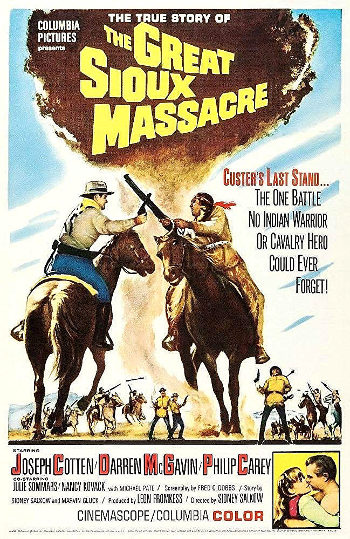 Joseph Cotton plays Maj. Reno, on trial for his actions at the Battle of the Little Big Horn.
Joseph Cotton plays Maj. Reno, on trial for his actions at the Battle of the Little Big Horn.
But the next witness is Capt. Benton (Darren McGavin), who says he – and not Reno – was the officer reluctant to rally to Custer’s aid.
The rest of the story is told flashback style, from the day Capt. Benton arrived to serve under Custer (Philip Carey) until that fateful day on the Little Bighorn.
For Benton, the assignment meant a reunion with former flame Caroline Reno (Julie Sommars), Reno’s pretty daughter.
But Reno doesn’t approve of the relationship. He’s a former Rebel officer and, despite serving in the 7th Cavalry, resents any man wearing the Union blue. He’s also a drunk.
As for Custer, he’s sympathetic to the Indians, despises the Indian agents who get rich at their expense, but proves adept at outwitting the Sioux chiefs when necessary.
Until those sentiments land him in trouble in Washington, D.C. and jeopardize his career.
From that point on, Custer is obsessed with glory and post-cavalry political ambitions, Indian interests be damned. And that puts him an odds with Benton.
Back in 1954, director Sidney Salkow bored viewers with “Sitting Bull,” starring Dale Robertson and a plot filled with implausible twists.
Flash forward a decade, and Salkow – armed with lots of stock footage from that film – tackles the events surrounding the Battle of the Little Bighorn again. The result is forgettable at best.
The plot isn’t exactly historically accurate. For instance, this tale has the attack on an Indian village at Washita River occurring after Custer’s D.C. entanglements in an attempt to restore former glory. In fact, Washita occurred years earlier.
Then again, the best Custer movies – “They Died with Their Boots On” and “Custer of the West,” for instance – mix fact with fantasy.
The real problem here is that McGavin, Cotten and Sommars aren’t up to pulling off the script they’re given. Carey is more charismatic, but isn’t the focus of the film.
The transitions Custer and Reno make – Reno suddenly stops drinking – don’t come off as believable. And McGavin’s escape from a prison detail is truly something. In all the wrong ways.
This wound up being the next to last film Salkow directed in a career that stretched back to the mid-1930s. McGavin, of course, is much better remembered for his role as the dad in 1983’s “The Christmas Story.”
Does anyone out have any idea why he character is named Benton rather than Benteen?
Directed by:
Sidney Salkow
Cast:
Joseph Cotten … Maj. Reno
Darren McGavin … Capt. Benton
Philip Carey … Col. Custer
Julie Sommars … Caroline Reno
Nancy Kovack … Libbie Custer
Michael Pate … Sitting Bull
John Matthews … Dakota
Don Haggerty … Sen. Blaine
Frank Ferguson … Gen. Alfred Howe Terry
Stacy Harris … Mr. Turner
Louise Serpa … Mrs. Turner
Iron Eyes Cody … Crazy Horse
John Napier .. Tom Custer
William Tannen … Miner
Blair Davies … Presiding officer
House Peters … Mark Cambridge
Runtime: 91 min.
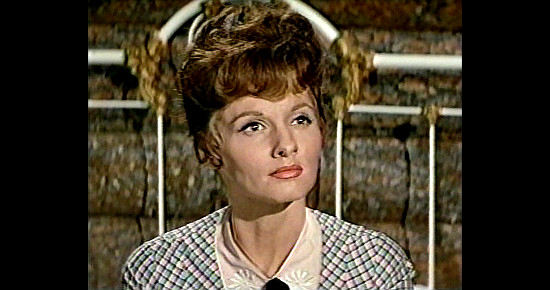
Nancy Kovack as Libbie Custer tries to comprehend her husband’s change in attitude toward the Indians in The Great Sioux Massacre (1965)
Memorable lines:
Capt. Benton, coming upon a slaughtered family: “Why did they decide to settle here? This is Sioux territory. It’s like trying to keep house on top of a keg of gunpowder. What did they expect to raise here?”
Dakota, his scout: “Kids — three of them.”
Capt. Benton: “Colonel, isn’t there some other officer you can assign?”
Custer, of Reno, after he shows up drunk at a post party: “If I could, I’d start by assigning Maj. Reno so some post in Siberia.”
Dakota, as Custer and his contingent approach the Sioux: “I can smell ’em.”
Custer: “That’s fear you smell. Maybe your own.”
Capt. Benton, smelling the food being served to agency Indians: “Even a buzzard would run from it.”
Dakota: “They’re not feeding buzzards. They’re feeding Indians. And one’s a lot higher on the social scale than the other, captain.”
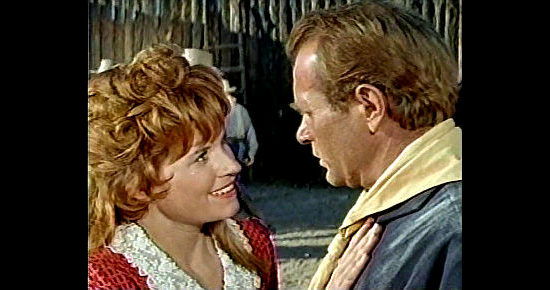
Julie Sommers as Caroline Reno with Darren McGavin as Capt. Benton in The Great Sioux Massacre (1965)
Dakota: “What you can’t get through your head, captain, is a man can live on hate as well as love.”
Capt. Benton: “You’ll live to find it’s a bitter substitute, Dakota.”
Gen. Terry to Custer: “The ambushes in Washington can match anything we see out her in ferocity.”
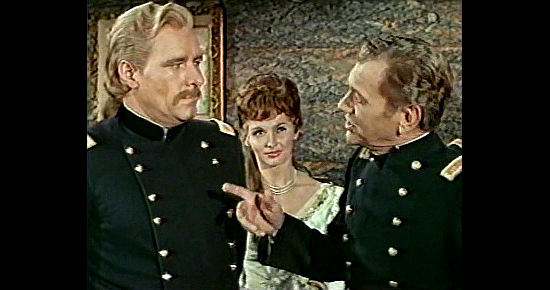
Philip Carey as Col. Custer shows patience with a drunken Maj. Reno (Joseph Cotton) as Libbie (Nancy Kovack) looks on in The Great Sioux Massacre (1965)
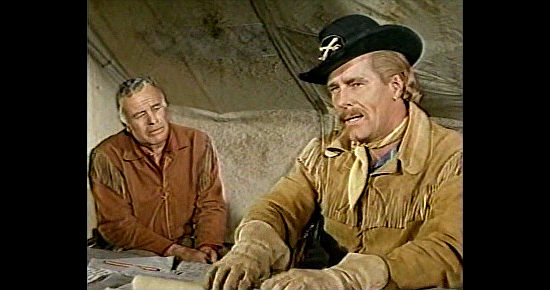
Philip Carey as Col. Custer contemplates a brillaint victory with newspaper reporter Mark Cambridge (House Peters) in The Great Sioux Massacre (1965)
Sen. Blaine to Custer: “Remember, Custer, Indians can’t vote.”
Sen. Blaine, advising Custer on his final campaign: “A desert cut in three pieces is never as rich or rewarding as the whole pie.”
Custer: “I’m in complete accord — the whole pie, undivided.”
Capt. Benton to Maj. Reno, about riding to Custer’s aid: “You’re the senior officer here. You give the order to die.”
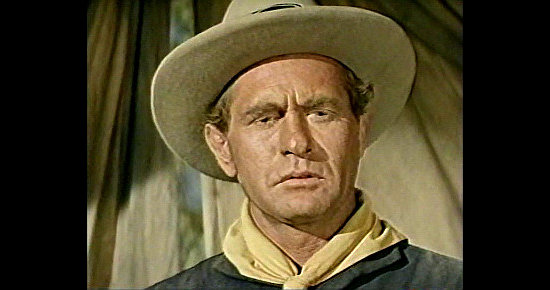
Darren McGavin as Capt. Benton tries to warn Col. Custer of the Indians’ gathered might in The Great Sioux Massacre (1965)
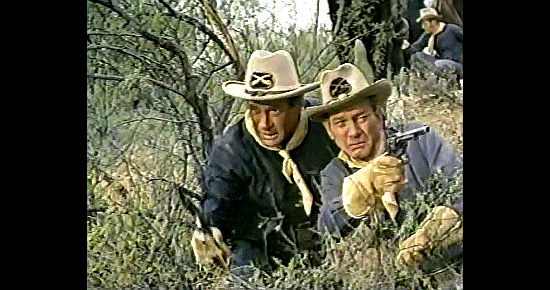
Darren McGavin as Capt. Benton and Joseph Cotton as Maj Reno debate the wisdom of riding to Custer’s rescue in The Great Sioux Massacre (1965)
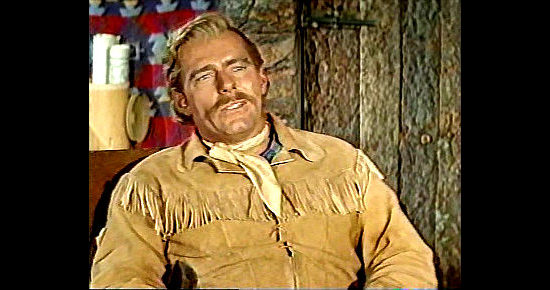
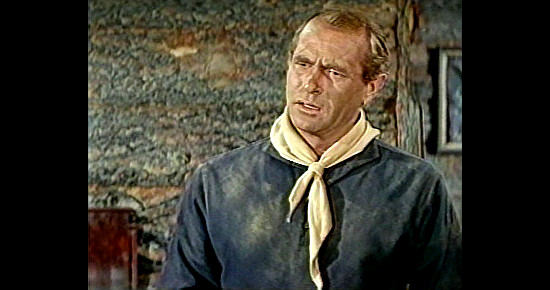

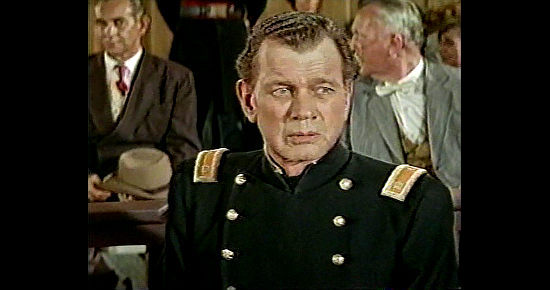
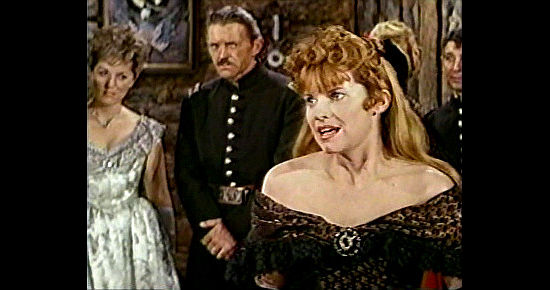
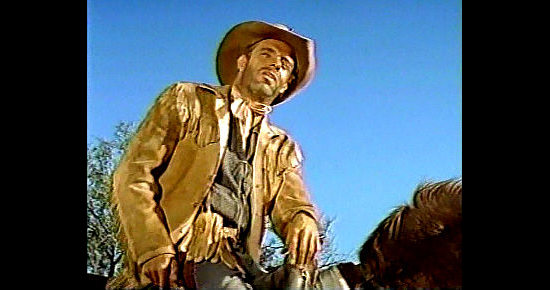
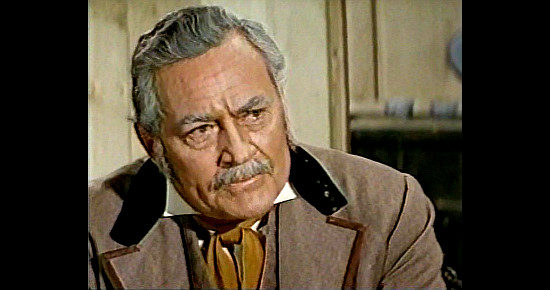
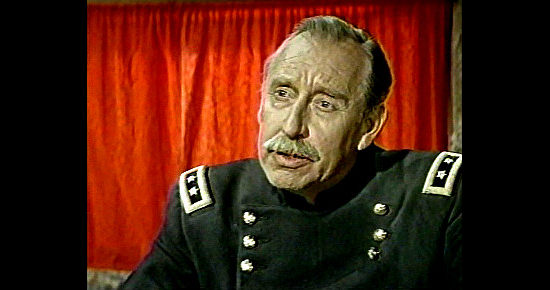
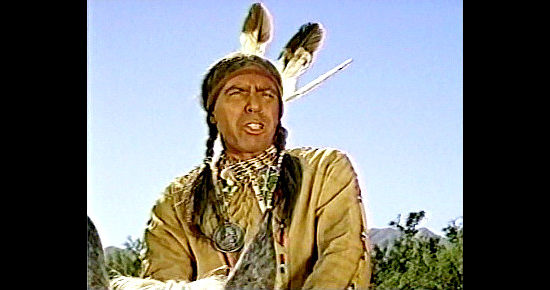
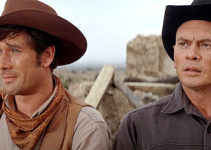
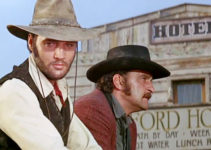
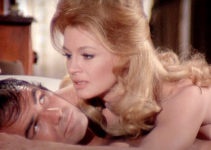
I grew up in the era when Native Americans and Japanese were depicted as the villains. It is with gratitude that I was taught the truth. These can be used to teach how opinions were influenced by untruths. Movies are powerful influencers and I hope to see new movies that show the truth about our consistent evil treatment of the native populations, the treaties that were broken and the failure to make amends by honoring those treaties no matter the cost.
Wow. Total trash, total fantasy-seems like a made for tv movie not a hollywood production. Amazing how many characters in this film have instantaneous changes of heart. Custer, Reno and Dakota do 180’s so fast it makes your head spin. Hodgepodge of battle scenes from other movies. Even lovable Darrin McGavin couldnt save this tripe and it looks like he never rode a horse before. The two best things about this movie are:
1) Iron Eyes Cody-the real life American Indian who sheds a tear in the 70’s pollution commercial
2) the poster with a mushroom cloud ‘cause this was a total BOMB!
Iron Eyes Cody was Italian, not native American, according to Wikipedia.